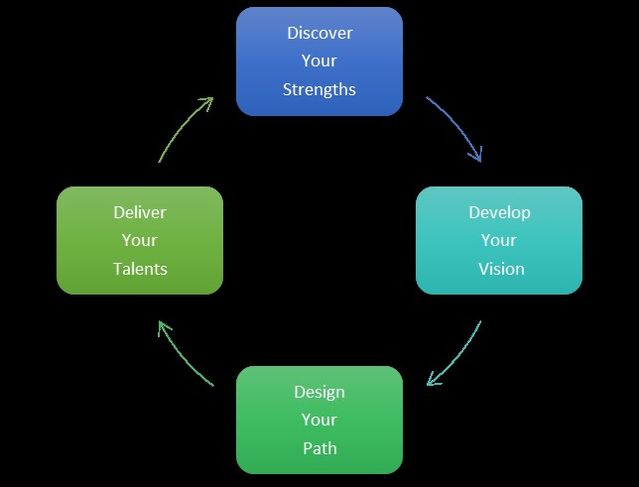Career
A Lifelong Career Development System
Learning the 4Ds can help you move successfully through your career.
Posted November 16, 2018
For the past 15 years I have been teaching thousands of individuals on a simple, yet powerful framework for starting out and moving through your career. It is easily adapted to a variety of career issues and works well with everyone from high school students deciding whether to further their education or enter the workforce, to adults planning their retirement. I created a customized version for college students and recent graduates, called “Wise Wanderings” which I describe in detail in my book, "You Majored in What: Designing Your Path from College to Career."
No matter where you are in the career development process, this framework will help you set goals, make decisions, and move forward. Because it moves you through four phases labeled “Discover Your Strengths, “Develop Your Vision”, “Design Your Path” and “Deliver Your Talents”, it’s abbreviated as the “4D” process. Adapted from a model called “Appreciative Inquiry”, this 4D Career Development framework can help you improve your current career situation or transition to your next step, whether that’s a new job, an entrepreneurial venture, back to school, or retirement.
For the next few blog posts I will do a relatively deep dive into each of the 4D’s. I will provide exercises and resources you can use to learn more about each phase of the cycle.
Here’s a diagram of the basic cycle:

As you look at this diagram, keep in mind that although the top phase is “Discover”, the truth is you can start anywhere in the process. For instance, if you’re currently employed or in school you are at the “Deliver” phase: you are “delivering” your talents in your current role. Bottom line: this is not some sort of upward ladder, but rather an ongoing cycle which you can move through throughout your life.
Let’s start by establishing your career goal. What are you seeking? Is it:
- A new career field
- Your next job
- Your first job
- A promotion within your organization
- Admission to college, graduate school, or a professional school
- A summer job or internship
- A transition back to the workplace after time away
- A new entrepreneurial activity
- A new major project, like writing a book or learning a new skill
- A transition into retirement
Jot down your goal. Add any questions or concerns you might have. Here are some examples:
- I would like to go to nursing school, but I’m not sure what it would involve or if I have the personality for the nursing field.
- I would like to find a better job in my field, but I can't move away from my current home.
- I need to decide on a career path but I'm not sure where to start.
- I'm in a job I like, but I'd like to look around and see what else is out there.
- I’m retiring soon and not sure what I would enjoy doing now.
- My children are in school now and I’d like to start a new career. Where do I start?
Now that you’ve created your goal, and identified a question or two you have, take a moment to decide where you might be on the 4D cycle:
- Considering a new career field or just starting the job search with a lot of questions? You’re probably in “Discover.”
- Confident about your strengths and abilities and now just seeking “what’s out there”? You’re in “Develop.”
- Already know your strengths (who you are) and where you want to go—you just need to map the path? You’re in “Design.”
- Finally, are you newly landed in your job or school and want to make the most of it? You’re in “Deliver.”
No matter what phase you’re in, try to approach each step of the process with the mindset of a learner. Be curious about yourself and what opportunities might await you. Focus on the positive: what is good about a situation, what could be better, and how can you improve it? While you want to be realistic about limitations (you probably can't play professional basketball if you're not tall enough), look for work-arounds to mitigate your limitations. Perhaps instead of playing basketball you could work for the marketing division of a professional team, or write about basketball for ESPN. Or you could volunteer your time coaching a youth basketball league. You can be around the milieu you enjoy, while providing your unique skills. Be creative and keep your mind open to new ideas and opportunities.
I hope you will find this framework worth exploring. My next post in the series will cover the “Discover” phase of the 4D cycle and can be found here.
© 2018 Katharine S. Brooks, all rights reserved.


